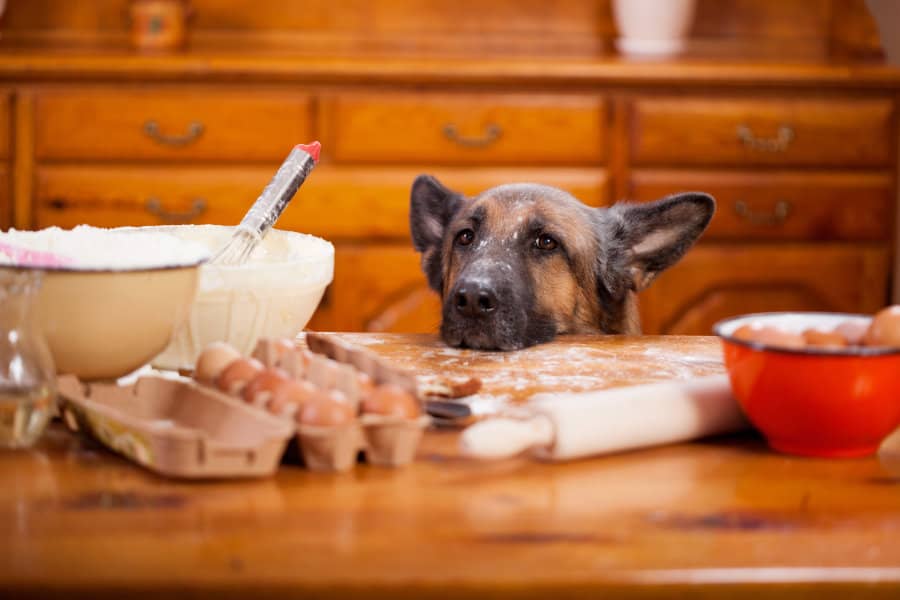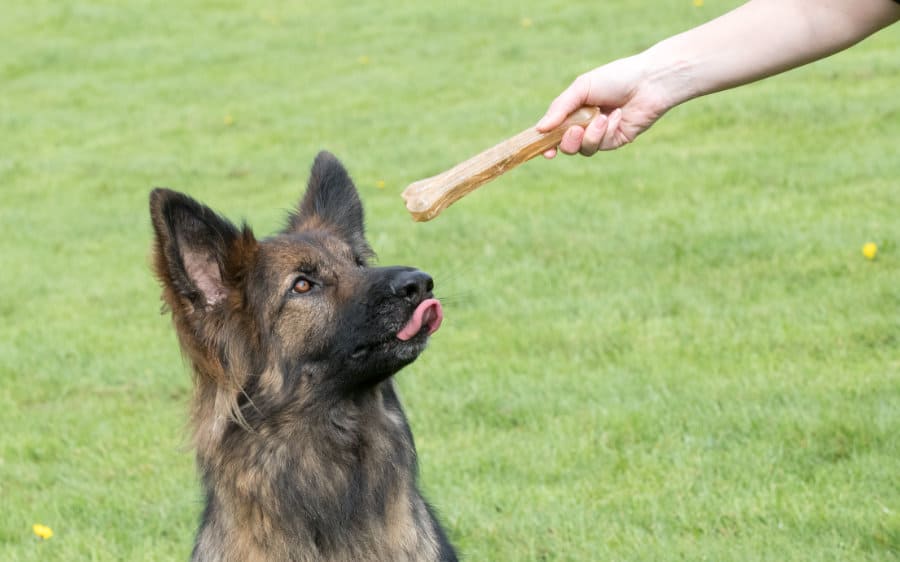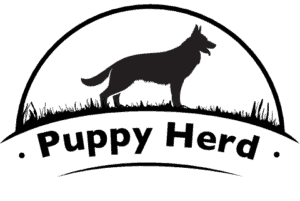German Shepherds will eat grass, insects, a piece of garbage found on the street, and even poop. Yet, some dogs still turn their noses up at a bowl of perfectly good kibble. German Shepherds have a reputation for being finicky eaters. How do you deal with this?
Appetite loss can indicate illness, so confirm that your German Shepherd is healthy. German Shepherds will eat when they are hungry enough, so offer them food at mealtimes, but don’t substitute their meals for treats and table scraps if they don’t eat. Try a different brand of dog food.
Picky eating in dogs, including German Shepherds, is often unintentionally encouraged by concerned owners. There are definite do’s and don’ts when it comes to getting a picky German Shepherd to eat its meals. These do’s and do not’s are detailed below.

Confirm If It Is Pickiness Or If Your German Shepherd Is Sick
German Shepherds are prone to digestive tract problems and food allergies. So, sometimes, what looks like pickiness is really an indication that your German Shepherd is suffering from a medical condition.
Suppose your German Shepherd suddenly stops eating or starts to show other symptoms such as lethargy, diarrhea, and pain-related behaviors. In that case, you should take them to the veterinary clinic for a check-up.
Common Stomach Problems Seen In German Shepherds
According to Pet Helpful, the following are commonly seen German Shepherd stomach issues that are symptomized by loss of appetite:
- Diarrhea: There are multiple possible causes of diarrhea in German Shepherds, but the most likely are food intolerances and parasites. Loss of appetite will often be a concurrent symptom with diarrhea.
- Eosinophilic Gastroenteritis: This is a condition in which the stomach and intestines of your German Shepherd become inflamed. Appetite loss can be a symptom of this illness, along with vomiting and diarrhea.
- Gastric or intestinal ulcers: Ulcers are usually a symptom of an underlying condition, but they become their own problem once formed. Ulcers are painful, and your German Shepherd may be refusing to eat because of the pain it causes. If your German Shepherd starts to produce bloody vomit or stool, it may be an ulcer.
Don’t Try To Tempt Your German Shepherd With Table Scraps
If your German Shepherd is refusing to eat its own food, but comes looking for you when you’re having dinner, resist! In this case, the idea that any food they will eat is good is not true.
Butter and oil are not healthy for you in large quantities, but they are not healthy for your German Shepherd in any amount.
Salt, seasonings, onions, chives, garlic, etc., flavor your food nicely and may smell very tempting to your German Shepherd. However, these foods are not just bad for your German Shepherd; they are toxic.
Alliums (garlic, onion, shallots, chives, etc.) cause allium poisoning in German Shepherds. Allium poisoning involves the destruction of red blood cells and can lead to anemia and other issues associated with the loss of these oxygen-carrying cells.
Salt will cause your German Shepherd to drink more water, and drinking large quantities of water at once is one of the possible causes of Gastric Dilatation Volvulus (potentially fatal bloating). Furthermore, too much salt can lead to sodium ion poisoning, the symptoms of which include vomiting and seizures. Sodium ion poisoning can be fatal.
Try Waiting Until Your German Shepherd Is Hungry Enough To Eat
The starvation method sounds harsh, but according to some veterinarians, German Shepherds can actually go a couple of days without food if they are healthy. If you are nervous to try this method, speak to your veterinarian about it when you take them to be checked for potential medical causes of their pickiness.
If you are offering your German Shepherd a well-balanced and nutritious meal and they refuse to eat it, you should just pick up the bowl and wait until the next meal. Offer them the food again and if they still refuse, pick the bowl up and repeat the process. Your German Shepherd will eat when they get hungry enough.
In our efforts to care for our German Shepherds, we can fall into the trap of encouraging picky eating. Not only is this not good for your German Shepherd, but it can become distressing and costly for you. Having to buy food after food, trying to tempt your German Shepherd to eat something, and then having no luck, can leave you with frayed emotions and empty pockets.
It may not be pickiness that causes your German Shepherd to turn its nose up at mealtime. Your German Shepherd may not be hungry. Perhaps you should re-evaluate how much you are feeding your German Shepherd, especially if they are on the heavy side.
Make sure that your German Shepherd is still drinking enough water, even if they are not eating. If they are still not eating after two days, consult your veterinarian.

Don’t Try To Tempt Your German Shepherd With Dog Treats
A German Shepherd’s pickiness may be the unfortunate result of a caring owner. This is especially true when a meal is replaced with a high-calorie treat. Your German Shepherd learns that by refusing their food, they get a reward.
Another issue with treats is that they can fill your German Shepherd’s stomach, especially if you give them a few treats close to mealtimes. If your German Shepherd is not particularly hungry, they are more likely to try to get something tastier to eat.
You should avoid training your German Shepherd before meals if you are using food-based reward methods.
Try To Change Your German Shepherd’s Food
If the starvation method partially works, in that your German Shepherd gets hungry enough to eat, but they can only bring themselves to eat a few mouthfuls, you can try changing brands of dog food.
Not all dog food brands are of equal quality. Additionally, not all high-quality brands will be right for your German Shepherd. A good-quality dog food will contain 18% animal protein, omega (3 and 6), and 5% digestive carbohydrates. Avoid foods that do not list animal proteins and contain fillers and artificial additives.
The following dog food brands are recommended: (Remember to get the large breed formula for your German Shepherd)
- Orijen Grain-Free Dry Dog Food
- Test Of The Wild Dry Dog Food
- EVO Dry Dog Food
- Natural Balance Limited Ingredient Diets
- Eukanuba German Shepherd formula
- Blue Buffalo Life Protection Formula
- Royal Canin German Shepherd
Consult your veterinarian about which is the best option for your German Shepherd. Remember, all dogs are different, and if your German Shepherd has known allergies, some of the brands listed above may contain these allergens.
Final Thoughts
If your German Shepherd is reluctant to eat or refuses their meals, they may be ill, and you should take them to see a veterinarian. However, if your dog has a clean bill of health but is still turning its nose up at its nutritious and well-balanced food, you need to be careful how you proceed.
It is very easy for a concerned owner to fall into the trap of rewarding pickiness with tasty treats and excessive variety. This perpetuates the behavior. Furthermore, you should not feed your German Shepherd table scraps because these are what they are showing an interest in. Human foods can be poisonous to German Shepherds.
Your German Shepherd will eat when they get hungry enough. Continue to offer them their regular food at mealtimes. If they don’t eat, take the food away after 10-15 minutes and try again at the next meal. Ensure you are feeding your German Shepherd the correct quantity of food and avoid giving them their treats (including training treats) before food time.
You don’t have to force them to eat food that they really do not like. If they are still not eating after a day or two, you can try a different brand of food, but don’t go crazy with the options.
